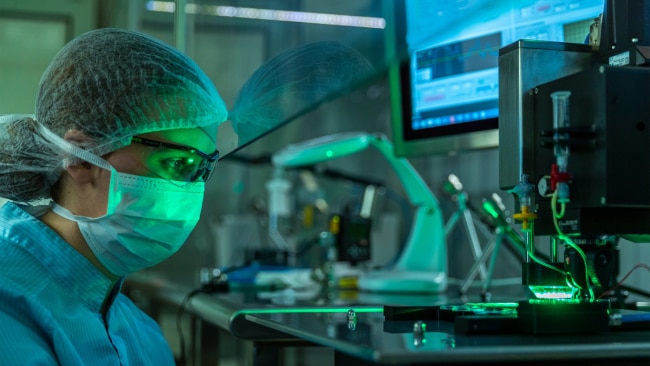Remote 'privatisation' row
THE wisdom of handing over administration of Aboriginal medical services to private interests is in question.
IN the Western Desert region of the East Pilbara, a battle is brewing in Aboriginal health policy. Four tiny Aboriginal communities - Jigalong, Parnngurr, Kunawarritji and Punmu - have been neglected by federal and state governments.
But in 2004 the federal government suddenly became interested in the communities' health clinic, the Puntukurnu Aboriginal Medical Service, initiating a review of governance and health service delivery that eventually led to a private company being awarded a contract to administer the service.
Five years later that company, Sovereign Health Care Australia, is still reaping a profit from its management of PAMS and the Aboriginal Health Council of Western Australia wants to know why.
In Jigalong, the community is becoming increasingly concerned that funded medical programs are not being carried out, nursing and Aboriginal health worker positions have remained unfilled for long stretches, and medical records are sometimes inaccessible to doctors because the health services administration is in Newman, 160km from Jigalong.
Publicly funded Aboriginal health centres long have been community controlled and serious questions arise when a private company is handed control of an Aboriginal health centre. Such circumstances should arise only when there is clear evidence of dysfunction in the running of the centre, Aboriginal Health Council of WA chief executive Darryl Kickett says.
"If you have a third party running an Aboriginal community controlled health service, the third-party arrangement should only need to provide for reforms that get an organisation back on track," Kickett says.
"I think what we are trying to do is guard against the ... behaviour of any third-party arrangement. We need a policy to deal with that, that is fair to everyone."
Months of controversy over the running of the health clinic came to a head yesterday at the PAMS annual general meeting. The AGM followed the recent election of new members to the PAMS governing committee, which were deemed invalid by the government watchdog for Aboriginal bodies, the Office of the Registrar of Indigenous Corporations.
One of those elected was Jigalong resident Billy Cadigan, 50, who says he is distressed to see a private company running his community's health centre.
"Our Martu people, they are the ones that set this health centre up back in 1984," Cadigan says. "I would like to get our Aboriginal medical service back."
The background to how PAMS became effectively privatised is complex, but it can be boiled down to a few key details.
In 2004, the federal government, through its Office for Aboriginal and Torres Strait Islander Health, initiated a review of PAMS on the back of infighting among management. The office chose a consultant, former New Zealand Accident Compensation Commission executive Gavin Robins, to carry out the review. Among the key findings were that PAMS lacked strategic business and health plans, that there were problems with corporate governance and that management and accounting services were being outsourced to Perth, bringing about "a steady decline in the service's overall performance".
Rather than assist the health service to strengthen its governance structures and improve its strategic planning, the office took the dramatic step of placing the administration of the health service in the hands of Sovereign Health Care Australia. Sovereign Health Care did not respond to Weekend Health's request for an interview.
Randolph Spargo has worked for PAMS as a remote physician for the past 11 years. Before 2004, Spargo was one of two doctors employed by the health service. The two took it in turns to travel the 1600km round-trip to each of the Martu communities for which PAMS is the primary healthcare provider.
Some time after Sovereign Health Care took over administration of the clinic, Spargo found himself working alone. He calls 2004 a "memorable year".
"I have been on continuous call ever since," Spargo says. The doctor received no explanation as to why Sovereign Health Care believed that just one doctor was sufficient to service four far-flung communities. Speaking from Jigalong, he says it has been a battle to maintain the continuity so essential to primary health care since he has found himself working solo.
"From the time I get into this clinic, I don't stop," Spargo says.
"I've got to answer the phones, I've got to hold things together. I've got to do things that I shouldn't have to be doing but I have to do to keep things rolling along."
The doctor lives in a house that is rapidly deteriorating. Yet as assets in Jigalong are neglected, Sovereign Health is paying tens of thousands of dollars each year in wages and rental costs for its management team in Newman.
When the health service's manager is on leave, no back-up labour is provided and Spargo says at times he has had to wait weeks for pathology results to be delivered.
Recently, Sovereign Health employed a second doctor for PAMS on a fly in, fly out basis. The doctor is employed to work continuously for four weeks, then have a four-week break before returning to the community.
Spargo is highly critical of this arrangement, which he says is detrimental to health service delivery and wasteful of taxpayers' dollars. "There is one word that is central toprimary health care and that is continuity," he says. "I believe the Australian Government would be very embarrassed if it was known that they are paying doctors to work in remote Australia to not work for four weeks at a time."
But Spargo reserves his most scathing criticism for the way a community-controlled Aboriginal health service effectively has beenprivatised with the sanction of the federal government.
"The real issue here is that you can't have a private company in management side-by-side by a single-tiered structure which has the authority for its association and its medical service," he says. An Aboriginal-controlled medical service can't sit side-by-side with a private entity. It needs to be Aboriginal controlled, not private controlled, and not by an absentee management."
But not everyone in Jigalong shares Spargo's view.
Community member Darren Farmer, who has a background in Aboriginal affairs, sees no problem with a private company running an Aboriginal medical service. "A lot of communities are administered and managed by outside firms, whether it be accounting or administration or whatever," Farmer says. "In this day and age a lot of communities are administered by outside sources anyway. What's the difference here?"
Farmer rejects Spargo's view that health service provision had suffered since Sovereign Health Care took control.
"As far as I am concerned, from a community point of view, the clinic is open, we have nurses in the clinics, we've got doctors there and people access services every day," he says.
A spokeswoman for the federal health department said the department was "of course concerned about some of the issues raised in relation to PAMS", and would "continue to monitor the situation".
However, she declined to comment on the specifics of the matters raised, saying they "related to the day-to-day operations of the organisation" which were the responsibility of PAMS.



